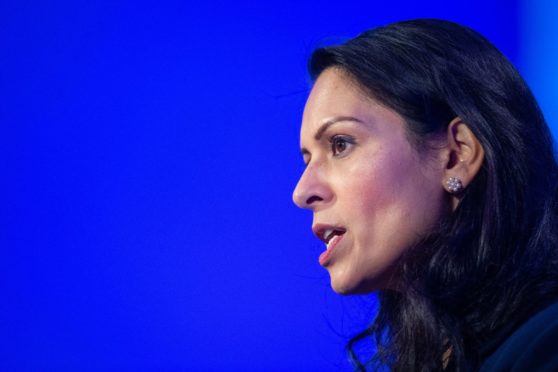Anyone arriving in the UK from abroad could be fined or even removed from the country if they fail to self-isolate for 14 days, Home Secretary Priti Patel has announced.
Under new Home Office rules, all incoming passengers will be required to provide contact and travel information at the UK border so health officials can later check whether guidance is being observed.
A breach of the self-isolation rules would be punishable with a £1,000 fixed penalty notice in England or potential prosecution and unlimited fine.
The level of the fine in Scotland, Wales and Northern Ireland will be a matter for each devolved administration.
Removal from the country would be considered as a “last resort” for foreign nationals who refuse to comply.
Exemptions for road hauliers, medical officials and fruit pickers will apply, while the common travel area with Ireland will be unaffected.
The measures, which will also apply to British people returning from abroad, are expected to come into force from June 8.
Ms Patel said: “As the world begins to emerge from what we hope is the worst of the coronavirus pandemic, we must look to the future and protect the British public by reducing the risk of cases crossing our border.
“We are introducing these new measures now to keep the transmission rate down and prevent a devastating second wave.
“I fully expect the majority of people will do the right thing and abide by these measures. But we will take enforcement action against the minority of people who endanger the safety of others.”
Professor John Aston, Home Office chief scientific adviser, added: “The scientific advice so far has been clear: while there has been significant community transmission of the virus within the UK the impact of putting in place additional border restrictions would have been negligible to the spread of the virus.
“However, the spread of the virus within the UK is now lessening. We have been successful in getting the reproduction number R – the average number of new people infected by one infected person – below one.
“As the number of infections within the UK drops, we must now manage the risk of transmissions being reintroduced from elsewhere.”
The move will anger some sectors, with Ryanair boss Michael O’Leary earlier this week branding the plan “idiotic” and “unimplementable”, while trade body Airlines UK has previously said a quarantine “would effectively kill” international travel to and from Britain.
Many other countries already require arriving passengers to enter a 14-day quarantine, including New Zealand, South Africa, South Korea, Spain and the US.
Tony Smith, now chairman of the International Border Management and Technologies Association, told the Commons home affairs committee on Friday that he was “surprised” the measures had not been introduced sooner.
He said: “I was surprised that we hadn’t seen earlier measures introduced at the UK border.
“I did live through a number of pandemics in my time in government, including Sars and bird flu, swine flu.
“The normal response is that there would be a significant introduction of public health into the ports and borders. That is what we would normally expect.
“I think there was some of that in some of the ports where hotspots were identified.
“The airports do have the capability, working with the Border Force and with the airlines, to isolate flights, to segment passengers into more remote areas of the airport and to conduct testing if such a thing is medically proven as being worthwhile.”
He called for a “great international set of standards for pandemics” and said he had not yet seen the “international collaboration that I think is needed”.
There has been a “very vast variation in the way that countries have approached this”, he added.
The comments came as one of the government’s scientific advisers attacked Downing Street for not acting sooner to stop the spread of Covid-19.
One could point the finger at ministers and politicians for not being willing to listen to scientific advice.”
Sir Ian Boyd
Sir Ian Boyd, a member of the Sage scientific advisory group, said: “Acting very early was really important and I would have loved to have seen us acting a week or two weeks earlier and it would have made quite a big difference to the steepness of the curve of infection and therefore the death rate.
“And I think that’s really the number one issue, could we have acted earlier? Were the signs there earlier on?”
He continued: “One could point the finger at ministers and politicians for not being willing to listen to scientific advice.”
His comments came after Sir Paul Nurse, chief executive of the Francis Crick Institute, said that the country had been “increasingly playing catch-up”.
Asked about the country’s approach to the outbreak on BBC Radio 4’s Today programme, Sir Paul said: “I’m not sure we are quite getting it right.”
He continued: “Everybody involved, not just the politicians, the scientists and the doctors, we’re all making mistakes and we have to try and learn from what mistakes have been made up until now.
“I get a sense the UK has been rather too much on the back foot, increasingly playing catch-up, firefighting through successive crises.”
Sir Paul also suggested it was unclear who was making decisions in government.
“I’m not completely convinced that we are actually being quite clear in having good leadership,” he added.
